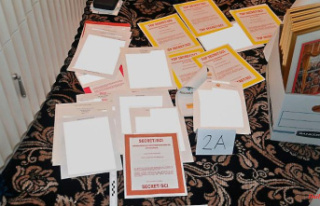The coalition committee on the third relief package will probably be a tough struggle. Who is given special consideration? With how much money? And where will it come from? The pressure on the government is high. Not least because the opposition and trade unions are threatening protests.
After weeks of debate, the citizens should get clarity about further relief because of the high energy prices. This Saturday, the coalition leaders will meet with Chancellor Olaf Scholz for crucial consultations. The Verdi union threatened Germany-wide protests in the event of insufficient relief. The Union asked the traffic light to make clear announcements.
CDU leader Friedrich Merz said at a meeting of the Union faction leaders in Murnau, Upper Bavaria: "We expect that the federal government will finally say how it wants to lead the country in the coming weeks and months." Verdi boss Frank Werneke announced that demonstrations were being prepared with other unions and social organizations in the course of the autumn. "They will be necessary if the federal government does not relieve the citizens sufficiently," said Werneke of the "Augsburger Allgemeine". The left and AfD also announced protests.
SPD parliamentary group leader Rolf Mützenich agreed with Finance Minister Christian Lindner's goal of agreeing on a "massive package". "It has to stay that way," said Mützenich at a closed meeting of his parliamentary group in Dresden. The SPD deputies unanimously decided on a catalog of demands for relief - including direct payments, a price brake for basic energy requirements and a nationwide 49-euro ticket.
How much should the relief cost?
Verdi boss Werneke is calling for "another 20 to 30 billion euros" for the current year. Finance Minister Christian Lindner only sees room for maneuver in the single-digit billion range for the package in the federal budget for this year. Among other things, he could scrape together the money because the tax revenue was better than expected, said the FDP politician. Green parliamentary group leader Katharina Dröge replied: "It will certainly not be in the single-digit billion range, what the coalition there should agree on." The previous two packages had a total volume of around 30 billion euros.
Where will the money come from?
The Greens are counting on the reduction of climate-damaging subsidies, a new regulation of company car taxation and a tax on excessive corporate profits. SPD faction leader Rolf Mützenich can also imagine a supplementary budget. For the tax estimator at the German Institute for Economic Research, Kristina van Deuverden, there are indications that many companies had revised their profit expectations down too much because of Corona - and are now paying back taxes.
Who should definitely get support?
Pensioners and students should definitely receive support - because one criticism was that they have received too little so far. Only those in employment benefit from the energy money of 300 euros from the second relief package. Chancellor Olaf Scholz told the "Westdeutsche Allgemeine Zeitung": "We will do something for pensioners and students and cut taxes for many." Federal Education Minister Bettina Stark-Watzinger also wants to support students. FDP parliamentary group leader Christian Dürr wants one-off payments to reach pensioners and students in particular this time.
The opposition also decided on demands in the relief debate. At their closed meeting, the leaders of the Union faction advocated, among other things, an increase in the commuter allowance and an energy allowance for pensioners and students. There should also be a gas price cap for basic needs. The Union faction leadership wants to cancel the planned gas surcharge. The left-wing faction, which also held a closed conference, also demands the latter. The parliamentary group is examining whether it should take legal action against the gas levy. In addition, the parliamentary group also spoke out in favor of direct payments.
What will become of the 9 euro ticket?
Federal Transport Minister Volker Wissing wants to achieve a successor solution, even if it will be more expensive than 9 euros a month. He also wants to hold talks with the states about sharing the costs with the federal government. The SPD is for a nationwide public transport ticket for 49 euros a month. The Greens want that too, according to their ideas, a regional ticket should cost 29 euros.
How targeted should the relief be?
The SPD parliamentary group focuses in particular on people with small and middle incomes. The Greens emphasize that they are concerned with targeted measures. The leadership of the parliamentary group proposes help for recipients of basic security, families, people with low incomes and pensions. FDP General Secretary Bijan Djir-Sarai demanded that the reduction of the cold progression in income tax proposed by FDP leader and Federal Finance Minister Christian Lindner must be "an elementary part of the third relief package". It should "expressly not only focus on individual groups, but also on the hard-working broad middle of society," he said.
Any questions left?
Even if the SPD, Greens and FDP really put together a "massive package," as Lindner and Mützenich want, the big calculations should start, the work on laws and deadlines. It is quite possible that the coalition leaders will meet again. It is unclear whether the concerted action by Chancellor Scholz with DGB boss Yasmin Fahimi and employer president Rainer Dulger still has a lot to settle after the expected relief package. They meet for the second time in mid-September. But one thing is clear: inflation, faltering supply chains and the threatening shortage of workers and skilled workers are creating a crisis scenario that is unlikely to be resolved with a coalition committee. And with citizen income, the coalition leaders are dealing with a major social reform on the subject of relief, in which not only the amount of the standard rates is important. Observers expect that even after Saturday there will be enough need for speeches.












